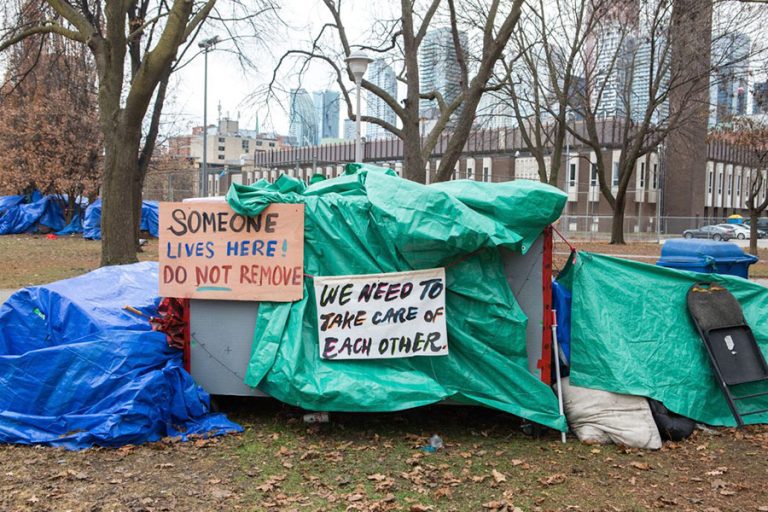During the summer of 2021, the city of Toronto spent nearly $2 million on clearing Toronto’s homeless encampments. Outdoor encampments became a way for those who are homeless to have some place to live outside of the city shelters, which are dealing with limited space and overcrowding. I believe that our unhoused population in Toronto should not be evicted from their encampments since evictions are only temporary solutions, the threat of the spread of viral diseases is minimised outdoors, and affordable housing acts as a more sustainable solution to Toronto’s poverty crisis.
Toronto Mayor John Tory said in a statement, “there does come a time when an encampment cannot continue to occupy a public park, to threaten the safety and health of people experiencing homelessness, and impact the families and communities who rely on these parks,” expressing the City’s concerns of the unsafe nature of outdoor encampments. However, while these concerns are valid, evictions from these encampments only act as a band-aid solution.
January 2022 has seen many days of sub-zero temperatures and according to Sanctuary Toronto outreach worker, Lorraine Lam, that post-eviction, it is not so easy to find a place in a shelter in this city. In an interview with CTV News, she stated, “Now, with the pandemic, there’s even less space available because of shelter capacities and distancing, so they can’t have as many people as they used to have.” Thus, many of those people end up trying to find other dangerous places to sleep when they lose their spot in a park.
Furthermore, many city officials cite the unsafe nature of outdoor encampments, but in the era of COVID-19, such perspectives need to be reconsidered. Amid the threat of COVID-19, outdoor homeless encampments adhere more closely with Toronto public health guidelines as according to the WHO, this virus is airborne and therefore, indoor congregations are unwanted. I believe that by evicting those without a permanent residence, we’re disregarding their safety concerns and this is only exacerbating the issue of homelessness in the city. When I watch the news discussing these evictions, there is often a lack of light being shone on those living in the encampments themselves, but we should not be glossing over these important perspectives to the issue.
20 shelters in Toronto have experienced COVID-19 outbreaks. In fact, according to the Canadian Observatory on Homelessness, a national research institute on homelessness in Canada, unlike many shelters that operate on a twelve-hour schedule, outdoor encampments provide individuals with 24/7 access to their belongings, which provides them with a sense of stability and prevents the need for excessive contact, thereby preventing the spread of the virus.
Considering these facts, we should instead focus on offering sustainable solutions to the housing crisis. In Toronto, there are about 8700 individuals living without a home, according to The Varsity. When I think about this crisis and even my own future living in this city, one solution that comes to my mind is looking at the ways in which we can reduce the cost of living, specifically in the context of buying a home. According to the Royal Bank of Canada Economics, in the last quarter of 2018, 66.1 per cent of the household income of an average Torontonian was needed to cover housing costs. This is an exceptionally high proportion of income being allocated towards paying for a home.
As I watch city officials on television justifying their reasons behind these encampment evictions, I cannot help but wonder if anyone has actually taken in the perspectives of those who do not have a place to call home. In schools, we do not often have conversations about the current state of the poverty crisis in the city, but we cannot afford to delay finding sustainable solutions any longer as the health of the city depends on the health of the population. Gaining compassion can go a long way and the more we understand why the homelessness crisis exists and the reasons behind the people coming up with temporary housing solutions, such as homeless encampments, the closer we will get to eradicating the plague of poverty in this city.
Works Cited
Akbari, Jasmin. “Opinion: No good comes from evicting people from homeless encampments.” The Varsity, 5 September 2021, https://thevarsity.ca/2021/09/05/homeless-encampment-evictions-toronto/.
“Fallout from Toronto’s homeless encampment removals continues.” CBC News, 25 July 2021, https://www.cbc.ca/news/canada/toronto/fallout-from-toronto-s-homeless-encampment-removals-continues-1.6116021.
Lorinc, Jacob. “Tents housing the homeless are popping up around Toronto. Here’s what the city is doing about it.” Toronto.com, 15 May 2020, https://www.toronto.com/news-story/9989699-tents-housing-the-homeless-are-popping-up-around-toronto-here-s-what-the-city-is-doing-about-it/.
Macdonald, Skye. “Home is Where the Heart is: Homeless Encampments as a Temporary Solution to the Housing Crisis.” HomelessHub, 24 March 2021, https://www.homelesshub.ca/blog/home-where-heart-homeless-encampments-temporary-solution-housing-crisis.
Neufeld, Abby. “Toronto’s homeless community sounds alarm on difficulties securing shelter space as temperatures plunge.” CTV News, 11 January 2022, https://toronto.ctvnews.ca/toronto-s-homeless-community-sounds-alarm-on-difficulties-securing-shelter-space-as-temperatures-plunge-1.5736143.
Vincent, Donovan. “Toronto spent nearly $2 million clearing homeless encampments in Trinity Bellwoods, Alexandra Park and Lamport Stadium.” Toronto Star, 17 September 2021, https://www.thestar.com/news/gta/2021/09/17/toronto-spent-nearly-2-million-clearing-homeless-encampments-in-parks-this-summer.html.



